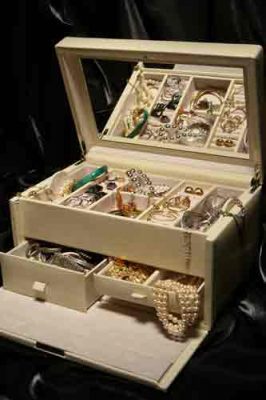Fun Reading, Tips & Recommendations
What Not To Do When Wearing Jewelry: How To Avoid Damage To Jewelry – And Yourself
Jewelry looks beautiful, elevates an outfit, and is a great way to express yourself. You might love your pieces so much that you never want to take them off! However, there are some activities that you should make sure you remove your jewelry for. You want to keep your jewelry safe, and you want to keep yourself safe too. To avoid damage to jewelry and lower the risk of personal injury, remember to take it off when you need to. But what activities do you need to remove your jewelry for? In this article, we have all the answers you may need.
Avoid damage to jewelry by taking it off when you need to
If you’re someone who never removes your jewelry, it can be easy to forget to remove it. However, cleaning, swimming, or just heading to the beach can all pose risks to your pieces or even your own safety. To help you know when to take them off, read through this list of all the activities where it’s best to ensure your pieces are safely stored away before you get started to avoid damage to jewelry – and yourself.
When you’re working on your tan
The sun’s out, and you’re probably excited to build up your tan this summer. After all, many of us didn’t get a chance last year, due to spending summer in lockdown. So in 2021, it’s high time that we get out there and enjoy the sunshine! But before you start tanning, make sure to remove your pieces.
Prolonged exposure to sunlight can break down the coatings on gold and silver plated jewelry. The sun can also bleach your metal earrings, bracelets and necklaces. This natural bleaching can cause your pieces to begin looking faded and dull. You don’t want them to lose their beautiful sparkle and glow! Before spending a day in the sunshine, make sure to store your pieces away somewhere safe.
Of course, the sun isn’t the only way to get a nice tan. Spray tans and instant tanners shouldn’t cause any lasting damage to your jewelry. However, they may discolor it or build up a grimy film on the surface of the metal. Therefore, many people prefer to take it off before tanning in this way, too. Taking off your pieces will also help to avoid tan lines!
When you’re relaxing at the beach
It’s coming into summer, and you’re likely excited to spend some days laying on the sand. However, beach conditions are not exactly jewelry friendly. Bright sunlight, moisture and salt from the water can cause damage to your pieces. Slippery lotions such as sunscreen and tanning oil can make it easier for pieces to slip off and get lost.
Plus, we’ve all seen people with metal detectors walking up and down the beach. Every day, people lose their favorite bracelets, necklaces, earrings and rings in the water or sand. If you lose something so small at the beach, it’s extremely hard to find it again. People using metal detectors to forage for lost jewelry know that beaches are an absolute treasure trove.
Therefore, this summer, make sure to leave your precious jewelry at home. If you really want to wear jewelry at the beach, try out beach beads. These trendy strings of beads have been seen in recent runway shows. With a laid back, bohemian look, this is a cheap and metal-free jewelry option that’s perfect for a beach day.
When you’re showering or swimming
Moisture is a number one culprit for tarnishing metal jewelry. Water can dull metals and gemstones such as diamonds, diminishing its sparkle and shine. The soap you use may leave a residue and make them look dingy. What’s more, in many parts of the world, tap water contains minerals such as chlorine and salts which may eventually tarnish your pieces.
Showering is one thing, but swimming is even worse. Pool chemicals can cause damage to precious metals like gold, silver and rhodium. The most impacted metal is likely sterling silver. When this common metal is exposed to chlorine, it tarnishes and can even turn black. Chlorine also affects gemstones, causing the smooth surfaces to wear away. This creates a bumpy, uneven look.
Swimming in the sea isn’t much better. Salt will quickly degrade metals such as copper, iron and sterling silver. Other metals, like gold, silver and rhodium can also be corroded by salt, although it does take much longer. It’s best to be on the safe side and remove all jewelry before swimming in the ocean.
When you’re cleaning
Harsh cleaning products can have a major impact on your jewelry. Many of your pieces are likely made from an alloy – a combination of metals. For instance, gold or silver is often mixed with a metal such as copper to make the piece cheaper and less malleable.
When alloys are exposed to many of the chemicals in cleaning products, it can be disastrous. At the scientific level, chemicals weaken the bonds between the metals mixed into the alloy. This weakens the piece, and means that chains and clasps will snap easily.
To prevent this damage to jewelry, you can wear gloves that cover your rings and extend far enough up the arm to cover bracelets. However, the safest choice is to simply put away your jewelry before you start scrubbing.
If you work in a germ-conscious environment
At an office job, you can probably wear modest, subtle pieces of jewelry every day. However, jobs that involve a high level of cleanliness aren’t a good time to wear your favorite pieces.
For instance, most restaurants and cafes won’t allow their staff to wear jewelry. Rings, watches and bracelets can trap bacteria, which may lead to food-borne illness. If you work in healthcare, it’s also best to avoid jewelry. In England, the law actually states that doctors must be bare below the elbows. This means no bracelets, bangles, watches or rings at all.
You should also leave it at home if you work with machinery or electricity. Silver and gold pieces could conduct heat or an electric current, so it’s not safe to wear these metals in certain jobs. Most workplaces that involve these things have a policy that no jewelry can be worn at work. Make sure you listen to your employer’s advice and leave any pieces in your locker or at home.
When you’re doing manual labor
If you work in a physical job, such as a factory, or you’re just getting some yard work done around your home, remember to take off your jewelry! Raking, mowing, digging, drilling, or whatever else are all hard on the body. These tasks put stress on your fingers and hands, and it’s easy for your pieces, especially rings or bracelets, to get broken.
Plus, dangling earrings, necklaces, and even long hair are a major safety hazard. You absolutely do not want to get these stuck in any moving parts, as this can lead to a serious injury.
When you’re sick or in the hospital
Many people wouldn’t think twice about whether or not to wear jewelry when you’re sick. However, wearing jewelry during an illness can cause more complications than you’d think! When you’re unwell, your body goes through many changes. Weight loss, dehydration and swelling are all common symptoms. If you’re a fan of wearing rings, this can cause some serious problems.
If you do get sick, it’s a good idea to make sure you remove any tight fitting jewelry. This includes rings, choker necklaces, and tight bracelets which may get stuck. Doctors also recommend taking off jewelry if you’re going to a hospital for any reason. This is mostly because jewelry can trap germs and increase your chances of getting an infection.
And if you’re there to get an MRI done, it’s absolutely vital that you remove any and all jewelry. This type of scan is done by a big magnet. Rings, earrings, and any other pieces can get sucked up towards the powerful magnet. This can be very dangerous and cause serious injury!
Looking after your jewelry
There are many ways to care for your jewelry. Make sure you clean your pieces regularly in soapy water and store them in a cool, dry place. Keep an eye on your pieces to make sure no gems are coming loose or clasps are on the way to breaking. If they’re starting to wear out, take them to your jeweler and get them fixed before it’s too late.
Keep in mind that the easiest way to avoid damage to jewelry is to simply take it off when you need to. There are so many harsh conditions which can tarnish your pieces. Chemicals, moisture, sunlight – the list goes on. It’s easy to overlook, but wearing jewelry can sometimes even be a risk to your own health and safety. For peace of mind, and to keep you and your favorite pieces safe, remember to take them off before doing any of the above activities.





